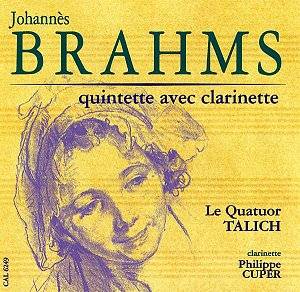|
|
Search MusicWeb Here |
|
 |
||
|
Founder:
Len Mullenger (1942-2025) Editor
in Chief:John Quinn
|
|
|
Search MusicWeb Here |
|
 |
||
|
Founder:
Len Mullenger (1942-2025) Editor
in Chief:John Quinn
|
 |
Johannes BRAHMS
(1833-1897) Clarinet Quintet in B minor, Op. 115 Wolfgang Amadeus MOZART (1756-1791) Clarinet Quintet in A major, K. 581 Talich Quartet Recorded live, 26 June, 1996 at the Théâtre Impérial de Compiègne |
| CD available for post-free online mail-order or you may download individual tracks. For some labels you can download the entire CD with a single click and make HUGE savings. The price you see is the price you pay! The full booklet notes are available on-line. | |
|
NOTE • Click on the button and you can buy the disc or read the booklet details • You can also access each track which you may then sample or down load. • Further Information. |
|
|
This most logical of couplings is actually not as common in the record catalogue as one might suppose. There are notable discs from an ad hoc group on Harmonia Mundi, the well-known Melos/de Peyer on EMI, and the performance that probably most resembles the present one, Harold Wright and the Boston Symphony Chamber Players on Philips. I mention this simply because these are in many ways old fashioned renditions, at least in terms of phrasing and tempo, but so musical and well played as to defy current trends.
The Mozart is generally the more sharply pointed, rhythmically speaking, of the two. The magical, arpeggiated entry of the clarinet in the first movement is deliciously phrased and makes a good foil for the smoothness of the hymn-like first subject. Throughout this movement, the interplay between strings and Ďsoloistí is exemplary, with many details (possibly teased out because of the live performance) coming fresh to the listener. Listen, for example, to the fp accenting towards the end of the development section (around 6.20), which is not forced, but is nonetheless suitably effective. The famous larghetto slow movement has exquisite poise and grace, with Cuperís intonation impeccable. One may wish for a tad more energy in the menuetto, but the relaxed pace has its own rewards; the first trio shows the first violinist, Petr Messiereur, to be alert and poetically responsive to the line woven by the composer.
The variation finale again is on the steady side, but a crisp, march-like main theme gives way to a logical unfolding of the many variants; predictably, the adagio final variation comes off particularly well, and once again one has nothing but praise for Cuperís beautifully moulded phrasing.
This genial, Romantic way with the music reaps more rewards in the Brahms, which receives an elegiac, reflective performance that is sensitive to the autumnal aspect of the work. The marvellous opening, with first and second violins in thirds, followed (as in the Mozart) by a rising arpeggio on clarinet, is both strongly sonorous and reflective. Time and again the pieceís affinity with its famous predecessor is pointed up, quite appropriately, and the warmly spacious performance has many things in its favour. The adagio, very much the heart of the work and one of Brahmsís great inspirations, comes off particularly well, with Cuper relishing the central, almost improvisatory, episode. The group obviously enjoy the syncopations of the andantino third movement, and though the central section is hardly presto, detail that is often missed comes through clearly. I have encountered a touch more gypsy fire in the con moto finale, but pacing is actually well conceived, so that a slight moving on towards the end does not sound rushed or breathless, but merely satisfyingly right.
The recording quality feels rather dry and claustrophobic at first, though oneís ears adjust to the close balance after a while. It seems Calliope favour this sort of sound, as the Talichís Beethoven Quartet series is recognisably from the same stable. The intimacy, especially in chamber music, is welcome, but one does have to put up, even more than usual, with the upbeat sniffs of the leader (more marked in this live recording), and a feeling of being literally on top of the players. Audience applause is justifiably left in, though elsewhere one would hardly guess this was live.
Recommended to those who like their chamber music served
up with a sunny, relaxed disposition.
|
|
ADDITIONAL INFORMATION •
You can sample only 30 seconds (or 15% if that is longer) of a given track. Select from the View tracks list. Each sample will normally start from the beginning but you can drag the slider to any position before pressing play. • PLEASE NOTE: If you are behind a firewall and the sound is prematurely terminated you may need to register Ludwig as a trusted source with your firewall software.
•You will need Quicktime to hear sound samples. Get a free Quicktime download here • If you cannot see the "Sample All Tracks" button you need to download Flash from here.
|
|
|
Return to Index |